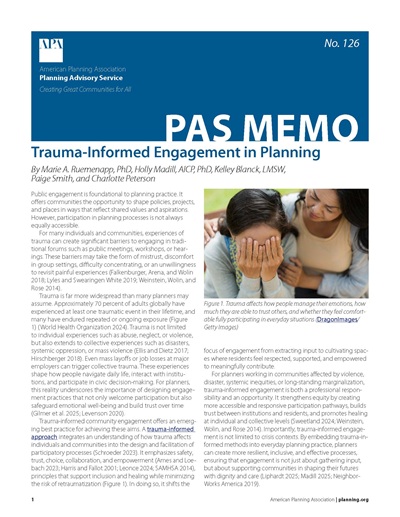Trauma-Informed Engagement in Planning
PAS Memo 126
By Marie Ruemenapp, Holly Madill, AICP, Kelley Blanck, Charlotte Peterson, Paige Smith

Not a member but want to buy a copy? You'll need to create a free My APA account to purchase.
Create account
Trauma is far more widespread than many planners may assume. Approximately 70 percent of adults globally have experienced at least one traumatic event in their lifetime, and many have endured repeated or ongoing exposure.
For many individuals and communities, experiences of trauma can create significant barriers to engaging in traditional forums such as public meetings, workshops, or hearings. These barriers may take the form of mistrust, discomfort in group settings, difficulty concentrating, or an unwillingness to revisit painful experiences. For planners, this reality underscores the importance of designing engagement practices that not only welcome participation but also safeguard emotional well-being and build trust over time.
Trauma-informed community engagement offers an emerging best practice for achieving these aims. A trauma-informed approach integrates an understanding of how trauma affects individuals and communities into the design and facilitation of participatory processes. It emphasizes safety, trust, choice, collaboration, and empowerment, principles that support inclusion and healing while minimizing the risk of retraumatization. In doing so, it shifts the focus of engagement from extracting input to cultivating spaces where residents feel respected, supported, and empowered to meaningfully contribute.
This PAS Memo explores trauma-informed engagement as a critical and timely approach to planning practice. It introduces the core principles of trauma-informed engagement, discusses strategies for putting those principles into practice, and examines a case study from Michigan State University that illustrates how planners and facilitators can adapt traditional engagement methods to respond to grief, foster collective healing, and ensure community voices remain central in moments of profound crisis.
Details
About the Authors
Marie Ruemenapp
Marie A. Ruemenapp, PhD, is a senior academic outreach specialist with the Michigan State University (MSU) School of Planning, Design, and Construction (SPDC). Ruemenapp has an appointment in the National Charrette Institute and MSU Extension. Prior to joining the SPDC faculty in 2019, Marie had over 30 years of Extension and community engagement experience working in communities across Michigan.
Holly Madill, AICP
Holly Madill is the director of the National Charrette Institute at Michigan State University. Over the last 20 years, Madill has developed a diverse set of skills, while coordinating and leading projects around a wide range of topics for the private, nonprofit, institutional and public sectors. She specializes in community engagement, placemaking, transportation and walkability, as well as development of trainings, surveys (including analysis) and proposals. She is a trainer for the NCI curriculum, MSU Extension Citizen Planner Program and the Zoning Administrator Certificate Program.
Madill holds a Bachelor's degree in Environmental Science from the University of Alabama and a Master's degree in Urban & Regional Planning from Michigan State University.
Kelley Blanck
Kelley Blanck, LMSW, has been an instructor at the MSU School of Social Work since 2016. Before joining MSU, she spent 20 years in the public mental health sector, gaining experience in both clinical and macro-level roles. Trained and coached as a Resource Parent Trainer through the National Child Traumatic Stress Network, Kelley has broadened her expertise from foster/adoptive trauma to encompass trauma-informed practices in higher education, teaching methods, organizations, and communities.
Charlotte Peterson
Charlotte Peterson holds a master's degree in urban and regional planning from Michigan State University. Her research interests include community engagement, economic and community development, and sustainability, with a particular focus on advancing equitable and resilient communities through collaborative planning processes.
Paige Smith
Paige Smith is a consulting assistant planner supporting Michigan communities across a range of planning efforts. Before entering the private sector, she trained with the National Charrette Institute as a graduate research assistant while attending Michigan State University. Paige is committed to furthering context-sensitive, community-driven planning processes.


